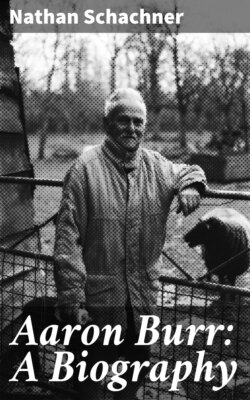Читать книгу Aaron Burr: A Biography - Nathan Schachner - Страница 39
На сайте Литреса книга снята с продажи.
4. Entering Wedge
ОглавлениеTable of Contents
There was a good deal of law business to be handled. Litigation over the confiscation of Tory estates proved immensely fruitful, with young Burr and young Hamilton already on opposite sides of the fence. There was also politics to be considered. Already, in June, 1783, he had been considered for an appointment under the new government. Judge Hobart, of the New York Supreme Court, had urged his merits in the proper quarters. But Burr, hearing of this, declined to be considered as entering into a scrambling competition for any office. It was a trait—this pride of self—which had already shown itself in the army and which was to be responsible for so much in his future career. Hobart, thus rebuffed, answered a bit sarcastically. “However pure your views may be [in seeking an office], I fear you must be contented with the character of a private gentleman so long as you determine to avoid a competition; for I am told there are long lists of applicants for all the offices in the city and county of New-York.”[150]
Nevertheless the rising young lawyer could not avoid the political lists—and competition. The politics of the infant State, and of the Nation too, for that matter, were still inchoate and shifting. The Revolutionary War had only recently ended, and idealism and martial enthusiasm still held their glamour, albeit they were fading a bit at the edges. The terrific struggle over the adoption of the Federal Constitution was still to begin—that struggle in which definite cleavages, ineradicable differences, were to emerge between class and class, between sections, between economic strata of society, between fundamental political philosophies, and harden into definite and violently opposed parties.
At the present, during the years 1783 and 1784, such cleavages, though they necessarily existed, had not shown themselves sharply and distinctly. Those who had favored the Revolution and participated actively therein were Whigs and patriots; those whose sympathies had been with the Empire or who had disclosed a certain lukewarmness were Tories and properly to be anathematized. Politics still were based on these broad and simple divisions, and the personalities of the candidates for office the chief consideration.
Burr early attracted notice. His obvious abilities as a lawyer, his breeding, his talents, his notable family, forced his name on the attention of the electors. He did not wish for office—at this time he had no hankering for the political fleshpots. But in spite of his manifest inertia, he was nominated for the State Assembly from the City of New York, and elected in April, 1784. George Clinton was then Governor, as he was to remain for a good many years, and the State was functioning politically under a Constitution adopted in 1777, in the very first years of the War.
